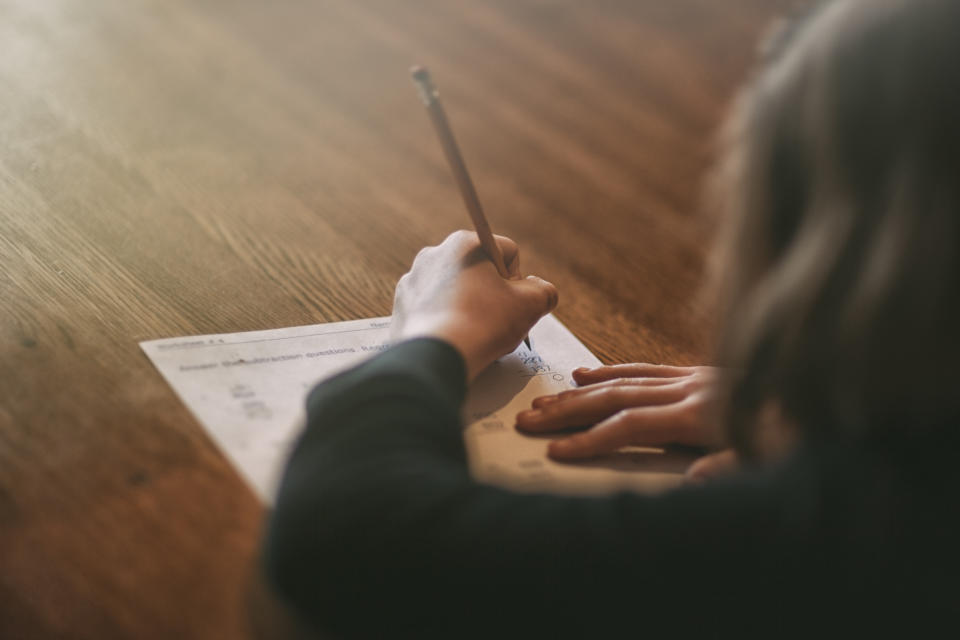'Why I won’t be homeschooling my child during the pandemic'
We are one week in to my five-year old son being off school, due to the coronavirus pandemic.
During that time, he hasn’t once sat down to do mathletics, spelling or handwriting practice. I haven’t drawn up a ‘home school schedule’ with colour-coordinated times, or asked him to sit down at a table and concentrate.
This is partly because my husband and I are busy trying to juggle our own uncertain work situations, as well as a lively three-year old and an active five-year old.
It’s partly because I don’t even want to pretend I have the skills of his excellent kindergarten teacher. But mostly, it’s because I honestly believe that a few weeks (or months) at home without ‘lessons’ will not harm him. In fact, it could actually be good for him.

In the space of a week, here are a few things he’s done; learnt to make his own sandwich at lunchtime; looked up what colour a stegosaurus’ skin was and drawn his own picture; worked out that holding ice cubes makes them melt more quickly than if they’re in a dish; spotted a spider outside and asked me to look up whether it was poisonous; learnt to scoot with one leg on the scooter handlebars; drawn the route from our house to the beach on a map; cuddled up with me for a mid-afternoon story; taken a sunrise walk; written numbers in the sand with a stick.
Yes, he’s watched Frozen 2 too many times, fought with his sister and had some tantrums. But by and large, the unstructured days we find ourselves enjoying have led to some discoveries and opportunities that perhaps he would never have been afforded in a more formal setting.
The lack of structure has also brought some other surprises. Usually, doing his home reading between me getting home from work and before bedtime is met with resistance. But this week, he’s been bringing his books to me and asking for us to read them together. Perhaps taking the pressure off, and not being expected to ‘keep up’, is helping learning become something to enjoy rather than suffer.
I’m lucky that my instincts have been backed up by my son’s school. They have sent some wonderful resources to parents (which I will of course use if my son wants to), but when his teacher phoned to check how we are doing, she told me our main priority should simply be to continue functioning as a family during such an unusual time. “Just make sure he’s happy,” she said.
Not every school has the same idea though, and it’s causing both parents and children enormous stress. One Sydney primary school emailed parents to say if their child wasn’t logged in to Google classroom every day and completing a certain amount of work, they would be marked as absent.
“It definitely adds extra pressure at a time when we’re all scrambling to work things out,” says Grace, who has a six-year old at the school. “We want to do our best by our daughter, but knowing she will be penalised if we don’t log in to three different portals every day to complete reading and maths work is really stressful. My partner and I are both working full-time from our small apartment, and now we are also trying to make sure our six-year old is underlining verbs and adjectives in different colours. I’m not really sure how we’re meant to keep it all going.”

“Our school has given us so much work,” agrees Amy, who lives in Brisbane with her five-year old daughter. After finding the first week overwhelming, they deliberately scaled things back. “We drew up a very flexible timetable, and it works as a nice guideline,” she says. “But we are using it only as a guideline.”
Educational consultant Dr Prue Salter believes now is not the time to be putting extra pressure on parents or children. “Some of the programs I have seen sent home by schools for young children are absolutely daunting. There is so much work expected to be completed in one day,” she says. “So the message is - chill. Put you and your child’s relationship, mental health and sanity before the educational outcomes. Do what you can. Pick your battles. Experiment and see what works for you.”
It’s hard not to feel a small flare of guilt when I see social media posts of children proudly showing their maths worksheets, or sitting at the dining table surrounded by books. But if this uncertain time in the world has shown me anything, it’s that looking after those we love - and their physical and mental health - is the most important thing we can do. School and all its formalities will be there when normality returns. But for the moment, chatting about dinosaurs and giving extra cuddles is just enough for us.
Got a story tip or just want to get in touch? Email us at lifestyle.tips@verizonmedia.com.

 Yahoo Lifestyle
Yahoo Lifestyle 




